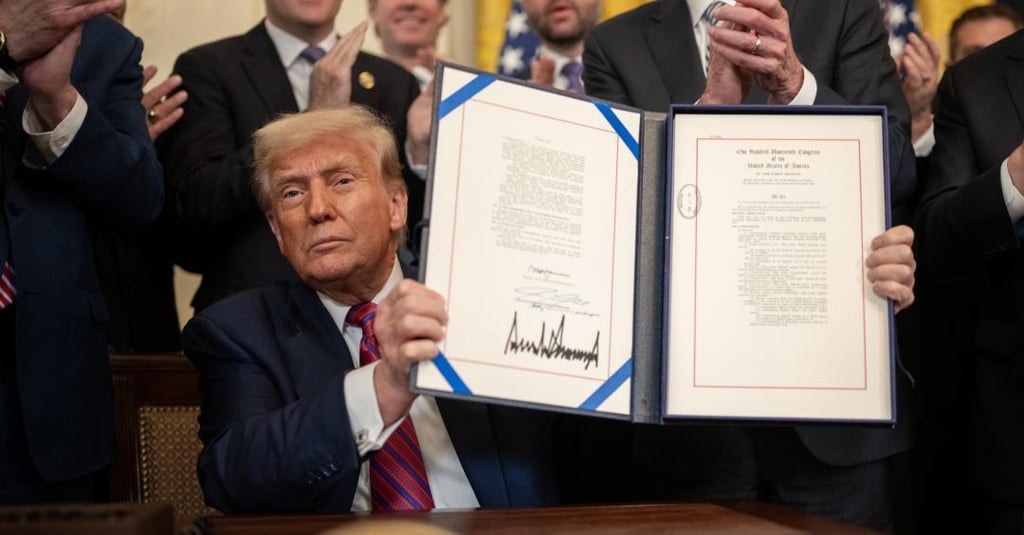Donald Trump Signs GENIUS Act to Regulate Cryptocurrency and Jokes, “They Named It After Me”
In a surprising twist, former President Donald Trump recently signed a new law called the GENIUS Act that aims to regulate cryptocurrency in the United States. The bill, officially known as the Guiding and Establishing National Innovation for U.S. Stablecoins Act, is the country’s first major attempt to put clear rules around stablecoins, a type of digital currency that’s tied to the U.S. dollar or other traditional money.
ECONOMY
Thinkbrief
7/19/20253 min read


At the signing ceremony held in the White House East Room on July 18, Trump was in a playful mood. Standing in front of lawmakers, crypto executives and supporters, he smiled and joked, “The GENIUS Act they named it after me.” The crowd chuckled, but beyond the humor, the moment marked a serious shift in how the government plans to handle cryptocurrency.
Stablecoins have been a wild card in the financial world. Unlike Bitcoin or Ethereum, they aim to keep their value steady by backing every digital coin with real dollars or government bonds. This makes them useful for everyday transactions, sending money overseas and even things like paying bills. But until now, the rules around how these coins should be managed and protected were unclear, causing worry among investors and regulators alike.
The new law sets a straightforward rule: stablecoin issuers must hold a full reserve of actual dollars or safe government assets equal to the amount of digital coins they’ve put out. They’ll need to prove this regularly through public reports and independent audits giving everyone confidence that the digital money is truly backed up. The law also requires these companies to follow anti-money laundering rules, which means they have to verify who their customers are and keep an eye out for illegal activity.
One of the most important parts of the GENIUS Act is protecting everyday users if a stablecoin company runs into trouble or goes bankrupt. The law makes sure that customers will be first in line to get their money back before corporate creditors, which is a direct response to the many crypto scandals and collapses we’ve seen in recent years.
Interestingly, the law opens the door for not just banks but also some non-bank financial companies to issue stablecoins provided they stick to the rules. This should encourage more competition and innovation while creating a unified system across the country instead of confusing different state rules.
The market’s reaction to the signing was immediate and enthusiastic. Within hours, the global crypto market surged past four trillion dollars in value. Bitcoin soared to over one hundred twenty-three thousand dollars before settling just under one hundred eighteen thousand dollars. Other major coins like Ethereum and Solana also jumped, and crypto investment funds saw record amounts of new money flowing in. This excitement reflects the hope that clearer rules will finally bring crypto into the mainstream financial world.
Supporters of the GENIUS Act say it brings much-needed clarity and protection. Trump called it “a historic step forward” for American innovation, saying the U.S. is now leading the way in digital currency. Leaders from big crypto firms like Circle and Coinbase applauded the law, saying it strikes a good balance between encouraging innovation and keeping consumers safe. Credit rating agencies even noted the law could strengthen the U.S. dollar’s position globally by boosting trust in dollar-backed digital money.
Still, not everyone is convinced. Critics warn the law might benefit big crypto companies while leaving some consumer protections weak. Senator Elizabeth Warren called it “a gift to big crypto” and expressed concern about potential loopholes. Transparency and privacy advocates say the law doesn’t do enough to protect users’ personal data or ensure strong enforcement. These concerns show that while the GENIUS Act is a start, there’s still work to be done.
What makes this moment even more interesting is how much Trump’s attitude toward crypto has evolved. During his first term, he was openly skeptical, often calling Bitcoin risky and unreliable. But since his re-election in 2024, he has embraced the crypto world, even launching his own meme coin and selling NFTs. His administration has proposed new ideas like a Strategic Bitcoin Reserve to compete with China’s digital currency ambitions.
With the GENIUS Act, Trump seems determined to leave a mark on America’s crypto future. By setting up a clear and regulated path for stablecoins, he hopes to position the U.S. as the global leader in secure digital finance.
Now that the law is passed, federal agencies have six months to work out the detailed rules that will guide banks and companies. The Treasury, Federal Reserve and other regulators will play key roles in making sure the law works in practice.
The crypto community is watching closely. If the new rules strike the right balance, stablecoins could become a common way to pay for things, send money internationally and even distribute government benefits. But if the regulations are too strict, they could slow innovation. If they’re too loose, risks of fraud and abuse could rise.
For now, the industry is celebrating this rare moment of clarity and the surprising presidential endorsement from someone who once dismissed crypto entirely. Whether the GENIUS Act truly lives up to its name depends on what regulators, lawmakers and innovators do next.
One thing is clear: digital money is here to stay and this law could be a crucial step toward making it safer and more useful for everyday Americans.

